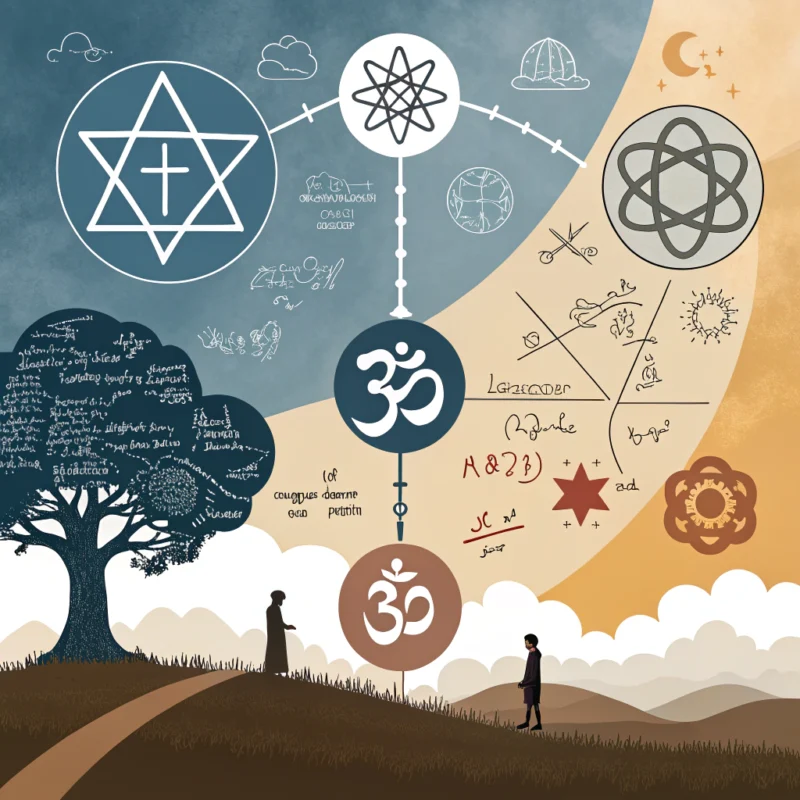Your beliefs shape how you see the world and yourself. They can limit your understanding and block your true potential. Many beliefs work in the background, influencing your choices and views without you realizing it.
But, the truth is, beliefs aren’t needed for truth to exist. Truth is there, waiting to be found, no matter what you believe.
Beliefs can make you doubt and feel uncertain. True understanding goes beyond doubt. It’s something you can feel and see without needing to believe in it.
Even believing in spiritual ideas or teachers can hide the truth within you. By noticing and letting go of your beliefs, you can see their pointlessness. This opens the door to discovering the vast truth that’s waiting for you.

Breaking free from beliefs means letting go of what you think you know. It’s about embracing a truth that’s beyond your current understanding. This journey can lead to deep peace and clarity, revealing a constant awareness that’s always been there.
By practicing the art of dropping beliefs, you can find the truth that’s always present. It’s here, now, ready for you to discover in every moment.
Understanding the Foundation of Belief Systems
Belief systems are the base of how we see the world. They include many biases, views, and cultural differences. Knowing how these systems affect us is key to finding the truth.
Types of Belief Formation
Beliefs come from our experiences, culture, and personal biases. Since we’re young, our beliefs are shaped by family and society. These beliefs help us understand the world as we grow.
The Role of Cultural Conditioning
- Our beliefs are shaped by our culture and society.
- Our views often mirror the stories and ideas around us.
- It’s important to understand cultural relativism to break free from our beliefs.
Impact on Personal Reality
Belief systems deeply affect our reality. They shape how we see things, make choices, and act. Seeing the power of these beliefs is the first step to truth.
The way we see the world is often a reflection of the beliefs we hold, not necessarily the truth. - Unknown

Exploring our belief systems gives us insight into our biases, views, and cultural influences. This self-awareness helps us understand the world and our role in it better.
The Influence of Beliefs on Perception and Reality
Our beliefs shape how we see the world. They act like lenses, filtering our view of reality. By looking at our beliefs, we can find the hidden truths.
Research shows that beliefs on big issues differ by political views. For example, a Pew Research Center study found big gaps in opinions on global warming and election interference. Democrats and Republicans have very different views on these topics.
Our beliefs are shaped by our experiences and worldviews. This leads to differences in how we see the world. Our cultural and personal backgrounds influence our beliefs, causing factual divides.
Perceptions are influenced by a combination of experiences and information.
We’re constantly getting information that shapes our beliefs. This is especially true for the growing divide between Democrats and Republicans. Their views of each other have become more negative over time.
By questioning our beliefs and seeking out different views, we can grow. This journey of truth-seeking requires an open mind. It’s about challenging our assumptions and finding the real truth of our world.

Exploring the Nature of Belief Systems and Truth
At the heart of our existence lies a fundamental question: what is the nature of truth? This journey explores the balance between our belief systems and the truths that shape our reality. Unlike beliefs, which change with culture, universal truths are timeless.
The Relationship Between Truth and Belief
Truth is intuitive and self-evident. It goes beyond our mental structures. Beliefs, however, need validation and rely on these structures for meaning. The challenge is to know the difference between what we believe and what is true.
Universal vs. Personal Truths
- Universal truths are timeless principles that resonate across cultures and societies, speaking to the fundamental nature of our shared existence.
- Personal truths, however, are shaped by our individual experiences, biases, and the unique lens through which we perceive the world.
Breaking Free from Limited Perspectives
Understanding reality involves seeing beliefs as temporary constructs. We must embrace the fluidity of truth. This journey requires challenging our dogma and cultivating rationality that goes beyond our epistemology.
The truth is simple, yet profound. It is not bound by belief systems, but rather, it is the foundation upon which our beliefs are built. - John Doe
As we explore belief systems and truth, we’re invited to let go of rigid constructs. This transformation empowers us to move beyond our limited views. It allows us to tap into universal truths that resonate at our core.
The Journey Through Inner Darkness to Light
Seeking spiritual truth often means diving into the metaphysical and philosophical. You must face your inner darkness to find the light trapped inside. This journey helps you understand yourself and your purpose more deeply.
This path is full of surprises and growth. You’ll meet challenges that help you grow and learn. By facing your fears and pain, you can find spiritual freedom and truth.
- The journey of spiritual transformation is a dynamic and empowering process, emphasizing individual empowerment through self-discovery and personal transformation.
- This path is neither a religion nor a traditional belief system, but a unique framework that encourages you to explore your own perspectives and uncover your personal truths.
- The metaphor of a landscape with hilltops symbolizes universal truths and individual perspectives, highlighting the uniqueness of each person’s journey through their personal darkness towards the light.
As you explore your inner world, you might find celestial constellations. They add depth to your journey, linking your personal views to universal truths. Remember, TULWA offers tools, not fixed truths, focusing on your personal growth.
Your uniqueness is a strength in this approach. TULWA values individuality and freedom. It aims for a balance between structure and openness, guiding you in your spiritual journey.
Transcending Traditional Belief Frameworks
Today, many people want to break free from old belief systems. They seek spiritual freedom and personal truths that truly connect with who they are.
Moving Beyond Religious Constructs
Leaving behind traditional beliefs means stepping away from strict rules and expectations. These rules might have given comfort and direction in the past. But they can also hold us back from growing and discovering ourselves.
Embracing Spiritual Freedom
- More people are turning to secular beliefs like humanism and rationalism. They look for meaning and purpose without supernatural beliefs.
- Secular spirituality, which uses reason and personal exploration, is becoming more popular. It helps people find fulfillment without supernatural beliefs.
- Critical thinking and skepticism are growing in value. People want to question their beliefs based on logic and evidence.
Finding Personal Truth
When we move past old beliefs, we might find a truth that goes beyond understanding. This truth isn’t tied to religion or culture. It comes from exploring our own inner world.
The ultimate truth is beyond words and description. It can only be experienced through the direct recognition of one's true nature.
By embracing spiritual freedom and personal truth, we start a journey of transformation. We can live authentically and connect deeply with others. This is true, no matter our religious or cultural backgrounds.
The Role of Critical Thinking in Truth-Seeking
Critical thinking is key when you’re searching for truth. It means questioning what you assume, being careful, and using your gut to know what feels real. By looking at spiritual and philosophical ideas with a critical eye, you can find a truth that feels true to you.
Critical thinking uses many ways to reason, like formal and informal logic, and even history and philosophy. It’s not just about being right; it’s about what’s useful, beautiful, and makes sense.
Being clear in critical thinking means making sure what you say is understood. You check if what’s said is true, useful, or makes sense. You look at how it fits with other ideas and experiences.
Looking at arguments is a big part of critical thinking. It’s about checking if the reasons given are strong enough to support the conclusion. Formal arguments try to make sure that if the starting points are true, the end result must also be true.
The scientific method and the Socratic elenchus are important for finding truth. The scientific method helps by observing, guessing, testing, and analyzing data. The Socratic elenchus uses questions to show the flaws in beliefs, leading to a deeper understanding.
By using critical thinking, you can better understand beliefs and truth. It helps you question and learn more about the world. This way of thinking is crucial for solving big problems, making smart choices, and keeping societies strong.
Navigating Cultural Relativism and Universal Truth
In our world, it’s key to grasp cultural relativism and universal truth for better understanding between cultures. Cultural relativism, first talked about by Franz Boas in 1887, says no culture is better than others. It teaches us to be empathetic, respectful, and open to different beliefs and ways of life.
Understanding Cultural Bias
Embracing cultural relativism helps us see our own biases. Studies show that mental health pros who think about cultural norms make fewer mistakes. By seeing things from different cultures, we can avoid thinking our own is the best.
Finding Common Ground
It’s important to find commonalities despite cultural differences. Cultural relativism means being open and respectful towards other cultures. This way, we can understand each other better and live in harmony.
Building Bridges of Understanding
Exploring both cultural relativism and universal truth changes us. We must challenge our biases, talk openly, and connect with others. This journey brings peace, unity, and a deeper love for our diverse world.
The moral code of our society holds no special status; it's just one of many.
Practical Tools for Spiritual Transformation
Starting a spiritual journey needs practical tools for growth and self-discovery. Regular study, reflection, and using spiritual insights in daily life can help a lot. Meditation, like the 4-7-8 breathing exercise, can make you more mindful and calm.
Self-reflection prompts, like “What do I hope to get out of today?” and “What activities express my sense of self?”, can reveal deeper truths. Journaling, guided by Monthly Entries for the Spiritual but not Religious through the Year, offers a structured way to explore spirituality.
You don’t have to stick to traditional religious practices. Exploring non-religious spiritual experiences through books, podcasts, and documentaries can find practices that fit your journey. Online communities and podcasts like On Being with Krista Tippett offer valuable insights and support.
Energy healing and chakra balancing are also tools for spiritual growth. They help align your physical, emotional, and energetic bodies. This can unlock new levels of self-awareness and inner harmony.
It’s important to use these practices in a way that feels true and meaningful to you. Your spiritual journey is personal, and the tools you choose should match your unique needs and dreams.
Conclusion: Embracing Your Authentic Truth Journey
Starting your journey to understand belief systems and truth is exciting. It’s a lifelong path of self-discovery and spiritual growth. By being open-minded and willing to learn, you’ll connect with your true self.
Your journey is special, shaped by your experiences and insights. It may challenge your beliefs, leading to a broader view of reality. Critical thinking and cultural awareness help you find your authentic self.
This journey isn’t about being perfect. It’s about exploring your inner world. Practices like Vipassana meditation help you find peace in a busy world. It’s about living in line with your values and dreams.
FAQ
What is the relationship between belief systems and truth?
Belief systems shape how we see the world. They help us understand who we are. But, truth is not bound by beliefs. It stands alone, needing no framework to prove it.
How are belief systems formed?
Beliefs come from culture and personal experiences. They can limit our view of reality. Many beliefs work quietly, shaping our choices and views without us noticing.
How do beliefs impact our experience of the world?
Beliefs color how we see the world. They can block our growth and distort truth. By questioning our beliefs, we can move closer to the truth.
What is the nature of truth?
Truth is clear and obvious, beyond our thoughts. It doesn’t need proof or frameworks. Universal truths are timeless, while personal truths come from our experiences.
What is the journey of spiritual truth-seeking?
Seeking spiritual truth means exploring the deep and the unknown. We face our fears to find inner light. This journey helps us discover who we are and our purpose.
How can one transcend traditional belief frameworks?
Moving past old beliefs means embracing freedom. We find our true truths, connecting with our real selves. It’s about letting go of expectations and finding our own path.
What is the role of critical thinking in truth-seeking?
Critical thinking is key in finding truth. It means questioning and using our intuition. This helps us understand spiritual ideas in a personal way.
How can one navigate cultural relativism and universal truth?
Finding universal truth means seeing beyond cultural differences. We seek common ground and understanding. This leads to peace and unity by bridging gaps.
What are some practical tools for spiritual transformation?
Tools for spiritual growth include studying, meditating, and living spiritually. These practices help us discover ourselves and deepen our spiritual understanding. They can include reading sacred texts or practicing energy healing.
How can one embrace their authentic truth journey?
Embracing your truth journey means being open and willing to learn. It’s a personal journey of growth and self-discovery. It’s unique to each of us, guided by universal truths and shaped by our experiences.



